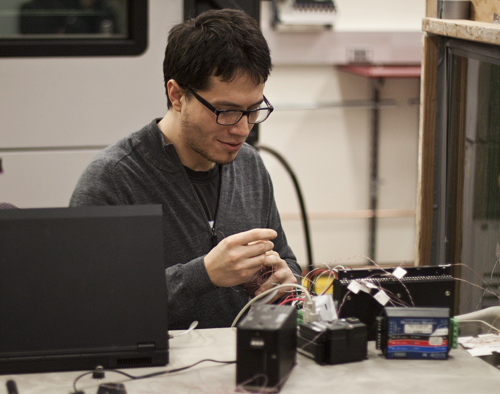Three graduate mechanical and materials engineering students returned to Portland victorious in the science of sustainability last week. Nicholas Hamilton, Jeff Lauck and Santiago Rodriguez where chosen to compete in CORE 2013, an international design contest held in Mokpo, South Korea.
Students pitch top ideas in Korea

Three graduate mechanical and materials engineering students returned to Portland victorious in the science of sustainability last week.
Nicholas Hamilton, Jeff Lauck and Santiago Rodriguez where chosen to compete in CORE 2013, an international design contest held in Mokpo, South Korea.
“We completely forgot about it,” said Rodriguez, who submitted the research with his schoolmates in December for consideration. “But we found out our material was accepted and left 10 days later.”
The trio presented research on wind turbine simulations and the TrekHaus, the first net-zero energy house in Oregon. The students were placed in the gold and silver categories by a panel of judges after competing against 65 teams from Korea, Japan, Taiwan, China, Vietnam and the U.S.
Hamilton presented on wind turbine simulations and Lauck and Rodriguez gave talks on the TrekHaus project. The TrekHaus—a project that has been a featured story on a KATU television news segment—is 90 percent more efficient than the average home.
Phase change material—an energy-efficient insulation—was the focus of Lauck’s research, while Rodriguez focused on equipment efficiency within the household.
“I think people in Korea and places like that are much more interested in sustainable practices because there are less resources to work with, especially electricity,” Rodriguez said.
The majority of competing teams were undergraduate students from Korea, but exceptions were made for international students in graduate programs.
The panel of judges consisted of numerous Korean professors, PSU professor David Sailor (who also served as the graduate students’ advisor) and a professor from Clarkson University in New York.
Other notable projects included a micro-scale hydroelectric generator, energy-saving technology for pumping systems and a machine that converts garbage into a hydrogen fuel cell—potentially capable of powering an electric car.
“There was also this thing called an ‘anaerobic digester,’” Lauck said, laughing.
The students have yet to publish their material but see the experience abroad as a way to gain valuable contacts and help support the reputation of sustainability at PSU.
“It’s really good publicity for PSU and our advisors,” Rodriguez said. “A lot of international students come here, so it’s great for the university.”





